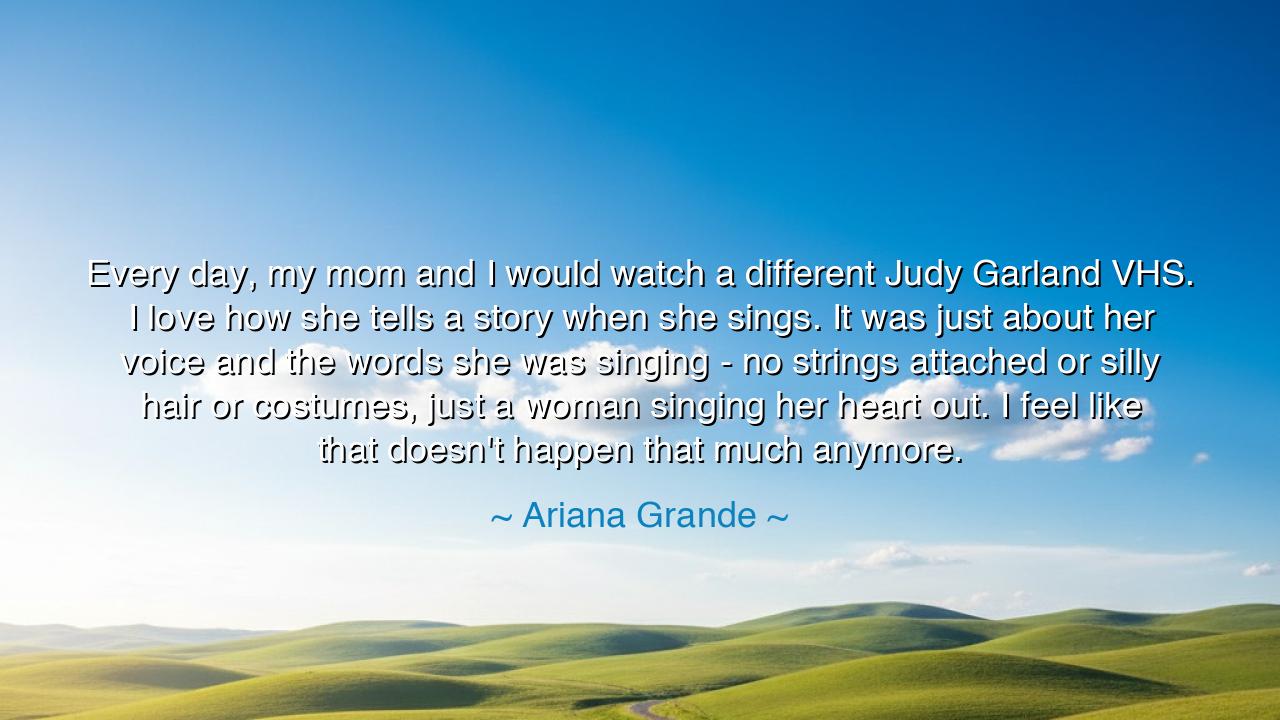
Every day, my mom and I would watch a different Judy Garland VHS.
Every day, my mom and I would watch a different Judy Garland VHS. I love how she tells a story when she sings. It was just about her voice and the words she was singing - no strings attached or silly hair or costumes, just a woman singing her heart out. I feel like that doesn't happen that much anymore.






When Ariana Grande said, “Every day, my mom and I would watch a different Judy Garland VHS. I love how she tells a story when she sings. It was just about her voice and the words she was singing — no strings attached or silly hair or costumes, just a woman singing her heart out. I feel like that doesn’t happen that much anymore,” she spoke as both an artist and a daughter — honoring the past while lamenting what has been lost in the present. Her words carry the quiet weight of nostalgia, reverence, and truth. In her admiration for Judy Garland, she recalls a time when art was not about spectacle, but about sincerity — when the heart, not the production, was the soul of performance.
At its core, this quote is a meditation on authenticity — on the purity of expression that transcends fashion, trend, and noise. In the ancient world, poets and orators knew this well. They believed that true beauty came from pathos — the power of emotion unclouded by ornament. When Ariana speaks of Judy Garland’s storytelling through song, she invokes that same timeless ideal: that the greatest performances are not the loudest or the most extravagant, but the most honest. To sing one’s heart out is to bare the soul before the world — to transform personal truth into universal feeling.
The mention of her mother gives this reflection even deeper meaning. Watching old VHS tapes together was not just entertainment — it was initiation, the passing down of artistic and emotional values from one generation to the next. Her mother, like a priestess of memory, opened a window to the golden age of song, teaching her daughter what true artistry looks like: not glitter, but grace; not perfection, but passion. This is how traditions endure — not through institutions, but through shared moments between parent and child. Grande’s artistry, then, is not merely her own creation but a continuation of that lineage, nourished by the wisdom of the past.
The figure of Judy Garland stands in this quote like an ancient muse — fragile, brilliant, unadorned. Her performances were marked by raw emotion; her voice trembled not because it was weak, but because it carried truth. She sang from the depths of her humanity, and that is why her songs still echo across decades. Ariana’s lament — “that doesn’t happen that much anymore” — is a cry that spans generations, mourning how art has grown louder but not necessarily deeper. In her reverence, she calls us back to the essence of creation: to move others by being real.
History is filled with echoes of this same tension. The philosopher Seneca warned that Rome’s love of spectacle would dull the soul, saying that when art becomes about noise and distraction, it loses its power to transform. Centuries later, artists like Vincent van Gogh and Billie Holiday would rediscover what Seneca meant: that true art is born not from artifice, but from vulnerability. Ariana’s reflection stands in this lineage — a reminder that even in an age of filters and fame, there is still sanctity in simplicity, still power in the unadorned voice.
Her words also reveal the spiritual hunger of the modern artist. Grande does not dismiss performance or glamour — she has built her craft within them — but she longs for balance, for a return to the sacredness of expression. In her memory of watching Judy Garland, she rediscovers the ancient covenant between artist and audience: to share not perfection, but truth. This is the artist’s burden and blessing — to feel deeply, and to let the world witness that feeling without disguise.
And so, the lesson is clear: in a world of spectacle, remember the power of sincerity. Whether in art, work, or life, the truest expression is the simplest one. Speak your truth plainly. Love without performance. Create not to impress, but to move. Grande’s memory of those quiet evenings with her mother reminds us that greatness is not built on excess, but on essence — that the most enduring songs are sung not by those who seek to dazzle, but by those who dare to feel.
Thus, to future generations: seek not to shine brighter than others, but to shine true. Strip away what is unnecessary. Let your words, your actions, and your art speak from the heart. For when the costumes fade and the noise quiets, what remains — as Judy Garland showed, and Ariana Grande remembered — is the voice that tells a story, pure and unguarded, glowing with the eternal light of the soul.






AAdministratorAdministrator
Welcome, honored guests. Please leave a comment, we will respond soon